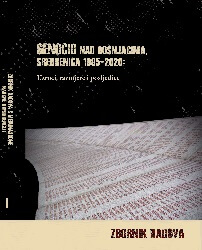Zaboraviti zlo – put ka pomirenju ili jedan od specifičnih načina negiranja genocida nad Bošnjacima
Forget Evil – The Path to Reconciliation or One of the Specific Ways to Deny Genocide against Bosniaks
Author(s): Muamer Džananović
Subject(s): Studies in violence and power, Victimology, Philosophy of History, Politics of History/Memory, Politics and Identity, Peace and Conflict Studies
Published by: Institut za istraživanje zločina protiv čovječnosti i međunarodnog prava Univerziteta u Sarajevu
Keywords: Bosnia and Herzegovina; continuity of crimes; genocide against Bosniaks; denial of genocide; forgetting evil; memory of evil;
Summary/Abstract: It is not a novus in scientific and public discourse to insist on forgetting the “burdening” past. Just as Friedrich Nietzsche did not find anything valuable in the memory of evil, believing that turning back turns us against life, so also lately, at the time of the strongest wave of genocide denial against Bosniaks, there are tendencies in public discourse that victims should forget evil committed against them. The oblivion is presented as a precondition for the way forward, the way to a common and better future, the way to development of the state and society of Bosnia and Herzegovina. It is forgotten that evil is “repetitive” as Hannah Arendt says regardless of the punishment. Once a specific crime occurs, its recurrence is much more likely than the possibility of its occurrence. The continuity of the centuries-long recurrence of crimes against Bosniaks, which is in fact a matter of the identity of the state and society of Bosnia and Herzegovina, but also of Bosniaks as victims, is an adequate example and proof of this attitude. The continuity of the centuries-long recurrence of crimes against Bosniaks, which in fact represents a matter of the identity of the Bosnian state and society, but also of Bosniaks as victims, is an adequate example and proof of this attitude. Consequently, in this paper we will look at (un)conscious ways and methods of denying genocide against Bosniaks, identify new methods of denial, certain deviance dealing in the aftermath genocide, but also to give recommendations in which direction the study of genocide in Bosnia and Herzegovina should go in order to adequately remember it, and finally stop the evil of genocide against Bosniaks that has lasted for several centuries.
- Page Range: 653-675
- Page Count: 23
- Publication Year: 2021
- Language: Bosnian
- Content File-PDF

